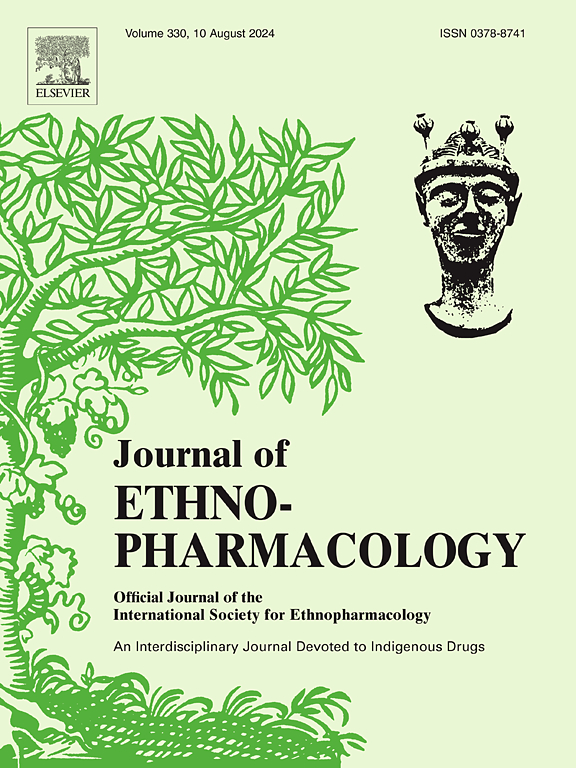Crude Polygalae Radix after boiling with licorice decoction alleviates intestinal mucosal barrier injury of rats by regulating TLR4/NF-κB signaling pathway
IF 4.8
2区 医学
Q1 CHEMISTRY, MEDICINAL
引用次数: 0
Abstract
Ethnopharmacological relevance
Polygala tenuifolia Willd. (pharmacologically termed Polygalae Radix, PR), a nootropic botanical in traditional Chinese medicine, demonstrates anxiolytic and cognitive-enhancing properties with two millennia of documented therapeutic applications. Long-term or large-dose use of crude Polygalae Radix (CPR) causes intestinal injury, which could be reduced by use of Glycyrrhiza uralensis Fisch. (licorice) decoction-boiled Polygalae Radix. However, the effects of boiling CPR with licorice decoction on reducing intestinal mucosal barrier injury have not been studied.
Aim of the study
Our research mainly focused on the alleviating effects and underlying mechanism of CPR after boiling with licorice decoction on intestinal mucosal barrier injury in rats.
Methods and materials
SD rats were orally administered CPR and licorice decoction-boiled PR (LPR) extracts respectively for 15 consecutive days. Subsequently, levels of pro-inflammatory cytokines and immunoglobulins were measured, and histopathological changes in intestinal tissues were examined. The mRNA expression levels of pro-inflammatory cytokines were evaluated by qRT-PCR. The expression difference of TLR4/NF-κB signaling pathway key protein and tight junction (TJ) protein were evaluated using Western blotting and immunohistochemistry.
Results
Processing PR with licorice decoction significantly ameliorated the downregulation of intestinal TJ proteins (occludin, claudin-1, and ZO-1) and elevated serum lipopolysaccharide levels induced by CPR. It alleviated the suppression of intestinal immunoglobulin A, serum immunoglobulin A and immunoglobulin G levels caused by CPR while mitigating intestinal mucosal injury and inflammatory responses. Additionally, processing PR with licorice decoction inhibited CPR-triggered upregulation of TLR4, NF-κB p65, p-NF-κB p65, and p-κBα proteins expression, while preventing IκBα downregulation in intestinal tissues. Furthermore, it significantly suppressed the upregulation of interleukin (IL)-6, IL-8, and tumor necrosis factor-α (TNF-α) mRNA expression while concurrently inhibiting the secretion levels of these pro-inflammatory cytokines in small intestine.
Conclusion
Our experimental data suggest that licorice decoction boiling effectively prevents CPR-induced reductions in TJ proteins and immunoglobulins expression, alleviates intestinal mucosal barrier injuries, and mediates these effects through suppression of TLR4/NF-κB signaling pathway activation and subsequent production of IL-6, IL-8, and TNF-α.

求助全文
约1分钟内获得全文
求助全文
来源期刊

Journal of ethnopharmacology
医学-全科医学与补充医学
CiteScore
10.30
自引率
5.60%
发文量
967
审稿时长
77 days
期刊介绍:
The Journal of Ethnopharmacology is dedicated to the exchange of information and understandings about people''s use of plants, fungi, animals, microorganisms and minerals and their biological and pharmacological effects based on the principles established through international conventions. Early people confronted with illness and disease, discovered a wealth of useful therapeutic agents in the plant and animal kingdoms. The empirical knowledge of these medicinal substances and their toxic potential was passed on by oral tradition and sometimes recorded in herbals and other texts on materia medica. Many valuable drugs of today (e.g., atropine, ephedrine, tubocurarine, digoxin, reserpine) came into use through the study of indigenous remedies. Chemists continue to use plant-derived drugs (e.g., morphine, taxol, physostigmine, quinidine, emetine) as prototypes in their attempts to develop more effective and less toxic medicinals.
 求助内容:
求助内容: 应助结果提醒方式:
应助结果提醒方式:


